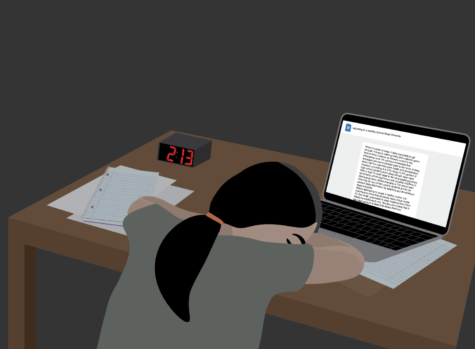
When it comes to sleep, it feels impossible to get enough. Forced to wake up early and unable to get to bed on time, it seems as if there’s no end to this exhausting cycle. It’s common knowledge that eight to ten hours of sleep are recommended for teenagers every night to maximize brain health and development. However, according to a CDC study, 72.7 percent of high school students don’t get enough sleep each night. Why is that? It could relate to the long waged argument about early school start times and circadian rhythms of developing teens. While changing a 7:30 a.m. school start time may be out of their control, students at LM can prevent sleep deprivation by adapting and developing a sleep schedule. Before attempting to create a healthy, routine it is important to know that all people have unique needs. Dr. Ron Anafi, a specialist in sleep medicine at Penn Medicine, explained to The Merionite that, “the amount of sleep that it takes for you to feel and think your best is different for different people. It’s not quite as much as a ‘one-size fits all’ thing as you might think.” In order to construct a personalized schedule, students need to figure out the ideal amount of sleep that allows them to function at their best. Proper sleep has a big impact on both health and performance in school. Sleep deprivation is linked to mental health issues, physical health issues, lack of creativity, and difficulty paying attention. Students who stay up late to finish homework ultimately harm their academic performance by taking away valuable hours of sleep which enable many important brain functions. In the long run, having a better sleep schedule can help students perform better on tests, focus in class, and lower their stress levels. The busy schedule of a high school student will be more manageable when tackled with a fully rested mind. Falling asleep early is not an easy task for high school students because their bodies produce melatonin at a later time than adults and kids. This change in hormone production shifts their circadian rhythms. Additionally, insomnia can result from the stress of busy schedules and life events.
Science aside, it can be difficult for students to manage their time after school so that they are able to complete extracurriculars, homework, and maintain a nightly routine. If students are struggling with these issues, it is important that they address them rather than deeming them unimportant. If students are on board with going to bed early but don’t know how to go about it, here are a couple tips from Anafi about how to alter one’s sleep schedule. Dr. Anafi says that although “you cannot control when your body falls asleep, for the most part you can control when you wake up.” Using this knowledge, “not letting yourself ‘sleep-in’ too much on weekends is a big help.” It is important to catch up on some sleep during the weekends but if one is waking up much later than normal, adjusting bedtimes and wake up times during the week will be harder. Anafi also recommended exercising in the mornings, minimizing exposure to bright light (particularly blue light) at night, and maximizing bright light in the mornings.
Although school work can make the minimizing of blue light at night difficult, it can be helpful to allot time to work on the computer earlier in the evening, while non-screen activities/assignments can be completed later in the evening. If students are able to get to bed early, their mornings and school days will be much smoother. The earlier one goes to bed, the less drowsy they will be when they first wake up and arrive at school. Although some changes may seem drastic and impossible to fit into a busy high school schedule, they are still worthwhile to try to adjust to. Taking the time to develop a healthy sleep schedule will greatly benefit students’ success throughout the rest of the school year.







